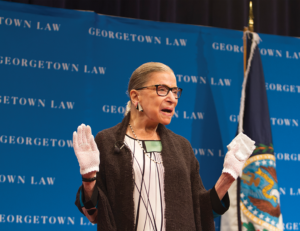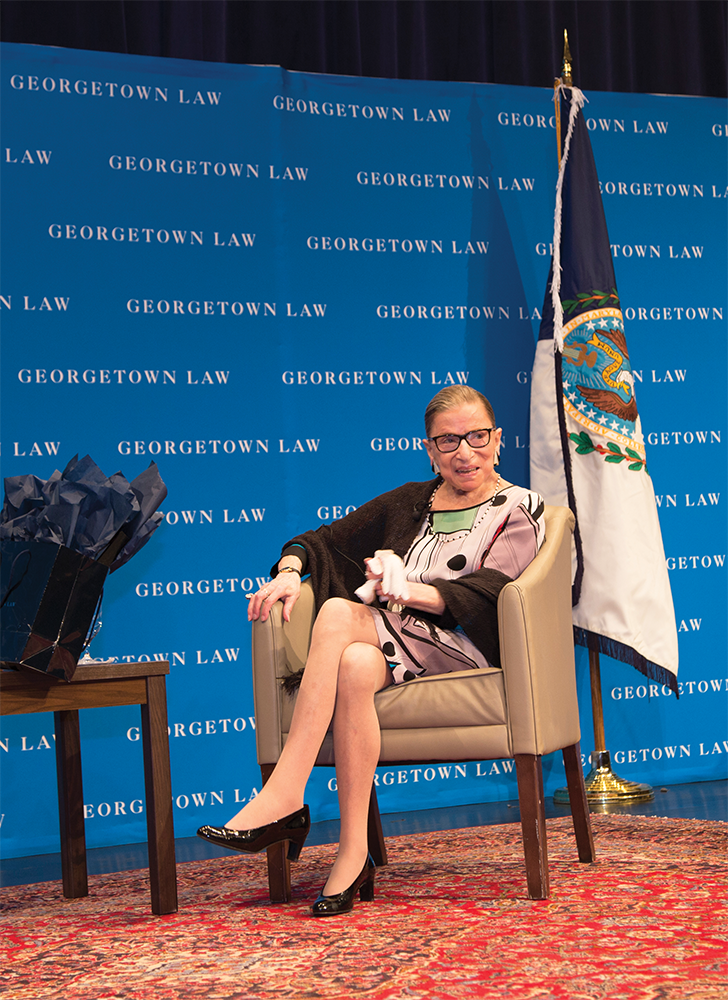Opportunities for women in the legal field have improved drastically over the past 50 years, said Supreme Court Justice Ruth Bader Ginsburg at the Georgetown University Law Center on Wednesday afternoon.
Ginsburg, speaking to first-year students at GULC, said the industry has seen a monumental shift toward gender equity in recent years, but that certain underlying issues still pervade.
“When I graduated from law school, there was no anti-discrimination law, there wasn’t even an equal pay act and employers were entirely up front about wanting no lady lawyers. Sign-up sheets for interviews for summer jobs or permanent associates on graduation often said ‘men only,’” Ginsburg said. “I don’t know how many times I heard from potential employers ‘oh we had a woman once at this shop and she was dreadful.’”

Supreme Court Justice Ruth Bader Ginsburg praised growing equality for women in the legal field in an address at the Law Center.
The discussion, moderated by GULC Dean William Treanor, covered a broad range of subjects, including the changing role of women in the field and the most notable cases the court has seen in recent sessions.
The second female to receive an appointment to the Supreme Court, Ginsburg praised the fact that the current first-year class of GULC students is majority female — something unheard of in Ginsburg’s time as a student.
“The contrast is gigantic. My entering class at Harvard included over 500 students. Nine of us were women. So we were strange, a curiosity,” Ginsburg said. “To look at a class like this is exhilarating.”
Ginsburg said she credits the anti-discrimination and employment laws in the 1960s for opening the doors of the legal professional world to women. The Civil Rights Act of 1964, for example, included a ban on gender discrimination. Ginsburg recalled a large lawsuit against a dozen top law firms in New York that were found guilty of discriminating against female applicants as a striking example of the shift.
A professor at Columbia Law School at the time, Ginsburg was privy to the early details of the case.
“The women at NYU and Columbia had this collaboration with their favorite male students and they asked the male students, ‘When you interviewed someone for a summer or a permanent job, ask them in their interviews: Level with me, what do you really think of woman lawyers?’” Ginsburg said. “And that’s the basis on which they got the 12 defendants.”
Ginsburg also credits both national and global feminist movements with not only her own success but also the growing number of women in the legal field.
“How did I decide to become a flaming feminist litigator?” Ginsburg said. “I was riding a wave, and was fantastically lucky that in the ’70s the women’s movement was coming alive all over the world.”
Ginsburg said much work remains to be done to achieve full equality in the legal workforce despite the advances that women have made in law over the years.
“There’s the question of having family life and a work life, and having a balance between those two. I’m always sad to hear people say that to climb to the top of the tree … a woman has to forgo her marriage and children,” Ginsburg said.
Ginsburg also devoted a significant portion of her speech to analyzing the cases from last term, systematically reviewing the court’s most contentious decisions.
Only nine cases of the 62 decisions released last term were categorized as a “sharp disagreement,” with the justices split between 5 and 3, or 5 and 4, after the appointment of Justice Neil Gorsuch, according to Ginsburg. She also noted that the court reached unanimous decisions in at least 31 of the cases.

Supreme Court Justice Ruth Bader Ginsburg urged continued focus on increasing equality in the legal industry.
“Agreement is substantially higher than sharp disagreement on the court,” Ginsburg said.
Ginsburg said a little-publicized case resonated with her the most — Maslenjuk v. United States, which posed the question, “Couldn’t a naturalized citizen be stripped of her citizenship if she committed an offense and failed to report it on her citizenship application?”
Chief Justice John Roberts was visibly shaken by this question, according to Ginsburg.
“Some time ago, [Roberts] confessed, of course, outside the statute of limitations, he drove 60 miles an hour in a 55. So, would such a confession prompt cancellation of naturalization?” Ginsburg said. “Justice Kagan said ‘I can’t recall how many times I have lied about my weight.’ The council comfortingly responded, unless they did so under oath.”
The next court term will begin on the first Monday in October. While Ginsburg looks forward to court resuming session, she was hesitant to make any definitive claims for the future.
“There’s only one prediction for the upcoming term, and that’s that it will be momentous,” Ginsburg said.




















